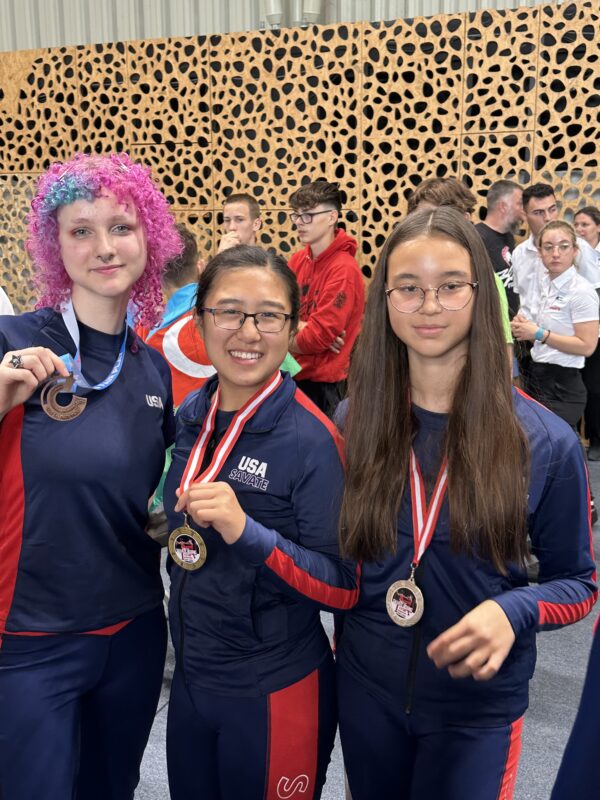Six Savate students become first-ever participants from the U.S.
JoAnn Wabisca had a plan.
Her students had never been in a competition before, but when they learned what they’d be doing, they simply followed their teacher.
All that remained was figuring out the logistics of getting to Podčetrtek, Slovenia, for the 2023 Savate Youth World Championships held in late June.
“[Wabisca] was like, ‘Oh, you guys are really good. We should probably go to World Champions,’” said Sienna McCord, one of Wabisca’s students at Ekata Training Center in Valencia.
McCord, set to be a freshman at Valencia High School this fall, was one of six students who Wabisca took to Slovenia for the world championships and one of two to earn a medal. The other was Logan Dino, set to be a sophomore at Canyon High School this fall.
McCord took silver in the 132-pound division for 13- and 14-year-olds, falling to a competitor from Italy in the final, while Dino earned gold in the 143-pound division for 13- and 14-year-olds, topping a Great Britain opponent in her lone fight.

“It was a relief to be done with on the competition and it felt good, because even though I only fought one person, I mean, gold is gold,” Dino said.
Lily Wright, set to be a senior at Santa Clarita Valley International in the fall, also earned a medal for fair play. The other U.S. competitors were Arin Lai, set to be a junior at Valencia High School; Luis Beltran, set to be a junior at Golden Valley High School; and Christopher Thompson, also set to be a junior at Golden Valley.
The most impressive part of their journey? This group became the first ever from the United States to be included in the Savate world championships, let alone win any medals.
“I didn’t think we would actually do it,” McCord said. “When [Wabisca] was actually telling us we were going to train for this and we had to get our weights, I’m like, ‘Wait, this is actually happening.’
“It was really surprising. But once you got into it, she was like, ‘OK, let’s focus.’ But it was surprising to actually know that we were gonna do it.”
Savate, according to a news release from the U.S. Savate Federation — of which Wabisca is the president — is a form of kickboxing in which fighters “must touch their opponent without hurting them.”


French in origin, Savate loosely translates to “fencing using the feet and hands with force and finesse,” according to the release.
Wabisca, who won the 2003 Savate U.S. Championships and the World Cup of Boxe Francaise Savate in Plovdiv, Bulgaria, later that year, described Savate as a mixture of fighting and art.
“The possibility of this to be very athletic — the jumps, the spins — is very theatrical and entertaining,” Wabisca said.
With the sport already immensely popular around the world, Wabisca is hoping to grow it in the U.S., and eventually make it an Olympic sport. Wabisca is focused on her home country first, though, and that involves talking to coaches at martial arts studios across the country to try to get them to participate in competitions.


One of the key reasons that Wabisca wants the U.S. federation to grow is the funding. The six students she took to Slovenia all went on their own dime, which she acknowledged was not a small drop in the bucket.
“Monetarily, the parents were 100% there for the kiddos,” Wabisca said.
The other reason that Wabisca is so intent on growing the sport in America is the introduction of different cultures. Both McCord and Dino were able to see just how intense the other competitors were and also how different the U.S. is from the rest of the world.
“It was great seeing all the different countries, all doing Savate,” Dino said. “They do it so differently over there; we’re over here in America, all alone.”
Of course, since they were already in Europe, the McCord and Dino families decided to make a vacation out of their trip and visited some other European countries. France, Croatia and Italy were the destinations chosen, and the kids were just as excited, if not more, to get to travel and experience the different cultures as they were to compete in Savate.
“It was a lot of traveling,” McCord said. “It was overwhelming. But we didn’t get delayed on planes or anything. So it was mostly just hauling luggage around that was the most annoying part. But it was really pretty and cool going to all these different countries and then having to stop and fight.”




Wabisca has a couple of ideas for the next competitions for her students, and now that she has a taste for it, Dino is excited to see what she can accomplish. McCord is unsure of actually competing but is on board with continuing to train and showing support for her friends.
“I like the competition, not the fighting, but like the competition spirit,” McCord said. “That was OK.”
Those decisions can be made at a future date. For now, Wabisca is proud of her students for not just breaking the barrier to get the United States on the Savate map, but also excelling.
“I was so impressed and pleased, even their conditioning, knowing what to expect,” Wabisca said. “We’re looking at this as this is the only way to grow it and to bring it back to America and grow it. But to keep the caliber going, we need to go [travel]. And that’s exciting.”













